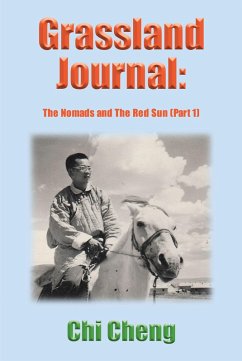This is the author's story written by tears. He is the center of this odyssey as a participant and an observer. It's a story about the loss of innocence, freedom, family, comfort, and family and about the good tradition of the Chinese culture that is slowly being lost. But it's also a story about gain and growth: gaining a few cultures and languages, new friends and trust, of experience and education, humility, of freedom, and regaining of self. Chi is not a hero in this narrative, just an ordinary man groping for meaning in his efforts to heal and help others. It is also a story of his own healing among the nomads of the grassland of Inner Mongolia. He survived and grew ever stronger in his own faith.
It chronicles the tragedy of a Christian family during the chaos of China's Cultural Revolution launched by Mao Zedong in 1966. The author's parents were detained, beaten, and abused by Red Rebels in 1968, due to in 1952, they held a farewell party for Dr. Frank W. Price, a former pastor in Shanghai, and because during China's 1959 through 1962 national starvation, they received foreign food from their siblings living in the United States. In 1968, the author's fourteen-year-old sister's application to a reunion with her sister who lived near the northern national border was turned down, so she had to cut her fingertips, then wrote a pledge with the blood.
The author records the primitive life of Mongolian nomads during his trip to the grasslands of Inner Mongolia to look for his two sisters and how he overcame difficulties with Mao Zedong badges as well as his unique acupuncture skills.
Chinese words and names using the pinyin system are in BOLD font. Mongolian names and words are in italic font. There are twenty photos/illustrations.
It chronicles the tragedy of a Christian family during the chaos of China's Cultural Revolution launched by Mao Zedong in 1966. The author's parents were detained, beaten, and abused by Red Rebels in 1968, due to in 1952, they held a farewell party for Dr. Frank W. Price, a former pastor in Shanghai, and because during China's 1959 through 1962 national starvation, they received foreign food from their siblings living in the United States. In 1968, the author's fourteen-year-old sister's application to a reunion with her sister who lived near the northern national border was turned down, so she had to cut her fingertips, then wrote a pledge with the blood.
The author records the primitive life of Mongolian nomads during his trip to the grasslands of Inner Mongolia to look for his two sisters and how he overcame difficulties with Mao Zedong badges as well as his unique acupuncture skills.
Chinese words and names using the pinyin system are in BOLD font. Mongolian names and words are in italic font. There are twenty photos/illustrations.
Dieser Download kann aus rechtlichen Gründen nur mit Rechnungsadresse in A, D ausgeliefert werden.


